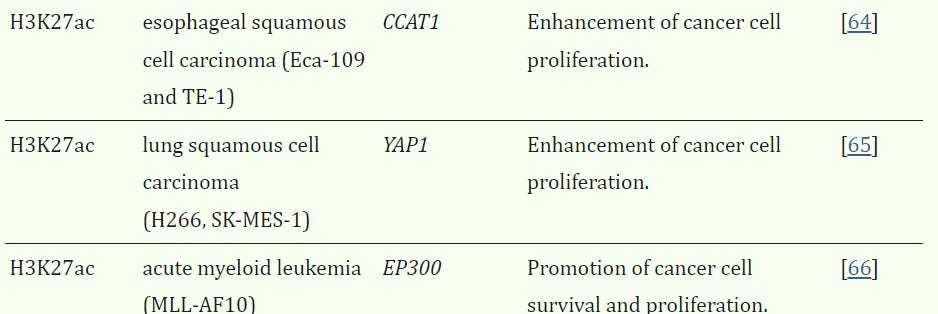URGENT: mRNA Covid jabs change genetic structures in ways linked to cancer and autoimmune disorders
Guest Post by Alex Berenson
Scientists call the changes caused by the Pfizer and Moderna shots “epigenetic” – they occur around DNA’s core and activate genes in ways that can promote tumor growth.
mRNA vaccination causes long-term changes in a crucial part of our chromosomes — changes previously linked to inflammatory and autoimmune diseases and cancers including leukemia and brain tumors.
The finding came in a peer-reviewed paper from German researchers last week. The discovery might help explain post-mRNA jab “inflammatory diseases which occur in… [some] vaccinated individuals,” the researchers wrote.
In a discussion with outside reviewers that was published along with the paper, the researchers suggested the changes they found are “very likely” occurring in bone marrow cells, the source of all blood cells. Their finding comes as other researchers report rising deaths from leukemia – a blood cancer – in very highly vaccinated Japan.
In the paper, published in the journal Molecular Systems Biology on March 25, the German researchers examined changes in the chromosomes of macrophages in people who had received mRNA Covid shots.
Macrophages are immune cells that circulate in the blood and attack and destroy foreign invaders like viruses and bacteria. The scientists found alterations in a crucial part of the macrophage chromosome called the histone.
Genetic scientists compare histones to drums around which cables of DNA are wrapped. Unlike DNA itself, the histones do not contain actual genetic information, but they provide the structure for it.
As a result, histones play a crucial role in processing genetic material. When they are bunched closely together, the DNA they hold is hard to access, so the cellular machinery that uses DNA to make proteins cannot do so. When histones are more widely separated, cells will process, or transcribe, DNA more actively — potentially leading to tumor growth.
—
The specific change the researchers found is called “histone 3 lysine 27 acetylation,” abbreviated to H3K27ac. The H3K27ac change is known to be found in several different types of cancer and has attracted increasing scientific attention.
In February, Chinese researchers published a review on it, suggesting that it had “emerging potential as a therapeutic target in cancer.” The paper examined “the genetic mutation and epigenetic mechanisms by which H3K27ac might contribute to various types of cancer… [and] future directions for cancer treatment that might involve targeting H3K27ac.”’
Last fall, researchers in Poland offered a similar overview. “Histone acetylation… regulates gene expression [and] is associated with cancer initiation, development and progression,” they wrote. They specifically noted that the H3K27ac change had been found in leukemia and other cancers, including gliomas, a deadly form of brain cancer.
—

—
In their paper last week, the German researchers found the H3K27ac alterations occurred broadly across many chromosomal regions. In addition, they found the changes when they examined macrophages several months after the shots, even though macrophages typically die in one to two weeks.
“We were able to demonstrate that SARS-CoV-2 mRNA vaccination establishes extensive and persistent H3K27ac at promoters [a specific region on the chromosome that encourages DNA transcription] of short-lived macrophages,” they wrote in the paper, which was titled “Persistent epigenetic memory of SARS-CoV-2 mRNA vaccination in monocyte-derived macrophages.”
That fact suggests that similar changes may be occurring in longer-lived “monocytes,” which produce macrophages, the researchers wrote.
In the paper itself, the researchers avoided suggesting that mRNA-driven histone alterations might also occur in an even more crucial part of the immune system — the bone marrow stem cells that produce monocytes and all other blood cells.
But in a discussion with a reviewer who encouraged them “to include examples of bone marrow HSCs [stem cells] reprogramming and how this may explain long-term [changes],” they responded that they believed it “very likely” the mRNA vaccines cause the same kind of changes in stem cells as they had found in macrophages.
Why the German researchers did not mention this possibility in the paper is not clear. Its lead and senior authors did not return an email for comment.
Leukemia is essentially a cancer of stem cells, and Japanese researchers have found a statistically significant increase in leukemia in Japan in 2022 and 2023. Japan relied almost exclusively on mRNA jabs against Covid, and nearly every adult received both the initial two-shot regimen and a booster.



